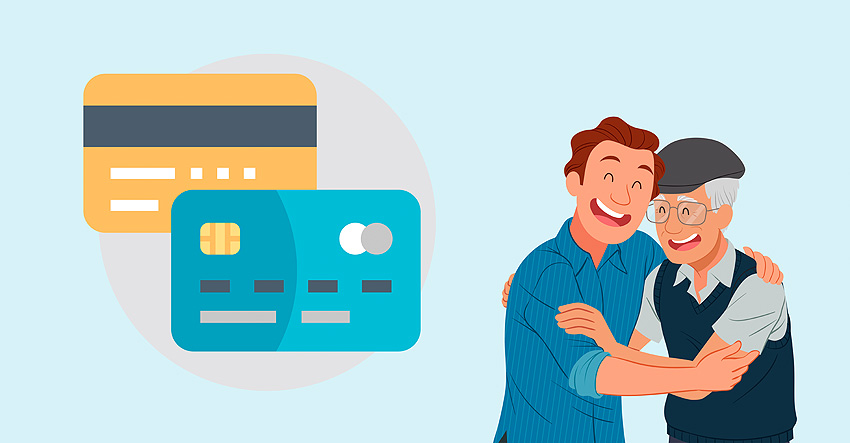Help our elderly with their finances – using their bank card in their transactions
11/08/2022
Nowadays, more and more people are opting to pay with a bank card instead of using cash. Bank cards are payment instruments accessible to all that allow multiple financial transactions, including physical purchases of goods or services, payment of taxes or online purchases. They also allow for other formalities to be performed, such as checking balances, making transfers or managing codes in ATMs. Therefore, bank cards are a key tool for financial inclusion.
Despite this, there are still segments of the population, such as senior citizens, who still prefer to use cash, either because they are not used to using bank cards or because they do not have enough confidence to use them securely. To help them overcome these fears, you can try to explain to them the types of cards that exist and the main advantages of using them, and give them some recommendations for using bank cards securely.
First of all, you can teach them to differentiate between the most commonly used types of cards:
- (i) Debit cards: these are obligatorily linked to an account and can only be used to draw on the balance of the current account with which they are associated. Also, security limits can be set on the amount that can be spent with them each day. Payments are debited at the time of purchase and they are often used to pay daily expenses, withdraw cash from ATMs or make online payments.
- (ii) Credit cards: these allow an amount to be drawn on in excess of the balance of the current account with which they are associated, as they are in effect granting credit that is available to the cardholder. They can also be signed up to without being linked to an account. Payments tend to be made at the end of the month and allow the option of either paying off the full amount (usually interest-free) or deferring part of the amount over a longer period (which usually incurs interest that can be high). They are subject to the control of the bank's Risk Department, so they may be denied depending on the applicants’ financial situation, because they appear on bad debt files or have excessive credit risk that can be identified through the Central Credit Register.
- (iii) Prepaid cards: they need to have a preloaded balance in order to be used, so that when a purchase is made, the amount is deducted from the preloaded balance. It is not necessary to open a bank account to obtain them.
Here are some of the advantages of bank cards so that you can assess with senior citizens whether it is in their interest to use them:
- (i) Security: Bank cards are secure. If they lose their card, they should notify the bank of the loss or theft as soon as possible so that it can be blocked and so that their money remains secure in the bank.
- (ii) Convenience: It is convenient to carry just a plastic card with you, with which you can pay if you need to. Also, unlike cash, bank cards allow you to make purchases online easily, securely and quickly.
- (iii) Efficiency: The use of the card avoids some inconveniences such as a potential lack of exact change in shops when paying with a large banknote, or receiving change in small denominations.
- (iv) Variety: There are different types of card and whether they choose one or another will depend on their interests and needs. For example, a debit card is the most secure for day-to-day expenditure and a credit card is the most secure for large expenses.
However, using cards also carries some risks that can be prevented. You must insist that they look after their security codes responsibly, that they make sure that the stores where they go shopping accept card payments (very widespread nowadays) and that they do not give in to the temptation to spend more because their payments do not involve the direct experience of handing over "money" (cash) that they no longer have in their pocket.
Security is key to making senior citizens feel comfortable with the use of cards. Therefore, it is a good idea to remind them of the basic recommendations and precautions for the proper and secure use of their cards:
- (i) Remind them to check the amount pending payment, if the card is a credit card, or the balance on their account before attempting to make another purchase, if it is a debit card.
- (ii) When making a card payment in a physical store, it is important that the transaction is made in their presence to avoid them copying the magnetic strip or entering a higher amount on the keypad than what has actually been spent.
- (iii) When entering the PIN number in the POS terminal, they should try to enter it quickly and in a hidden way and check first that the amount entered is the correct one. They should not forget to ask for proof of purchase or of a cancelled transaction.
- (iv) If they use their card for online payments, it is best that they avoid leaving their bank details stored on the website or app and only enter them when they are going to make a specific purchase.
- (v) Warn them not to share passwords, PIN numbers or any other data related to their cards or bank accounts with anyone.
- (vi) If, despite having taken the above precautions, a theft, loss or unauthorised transaction or formality occurs, they must report it as soon as possible to a police station, and notify the bank and request its cancellation.
- (vii) Talk to senior citizens and set a ceiling on daily transactions to minimise the impact in the event of fraud. Also, set up alerts on their mobile phone so that they are aware of transactions and can identify those that are not familiar.



